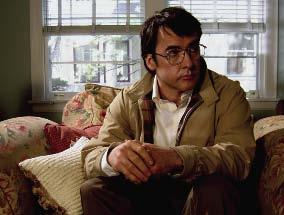 The only double award winner for drama at the 2007 Sundance Film Festival was James C. Strouse’s powerful debut film, “Grace is Gone.” John Cusack gives a remarkably restrained performance as Stanley Philips, a father of two girls, confronted by a shocking reality. Stanley’s wife, Grace, dies serving as a soldier in Iraq. How and when should Stanley communicate such horrible and life changing news to his daughters? “Grace is Gone” presents a profound, de-politicized portrait of grief. It is about the human cost of war.
The only double award winner for drama at the 2007 Sundance Film Festival was James C. Strouse’s powerful debut film, “Grace is Gone.” John Cusack gives a remarkably restrained performance as Stanley Philips, a father of two girls, confronted by a shocking reality. Stanley’s wife, Grace, dies serving as a soldier in Iraq. How and when should Stanley communicate such horrible and life changing news to his daughters? “Grace is Gone” presents a profound, de-politicized portrait of grief. It is about the human cost of war.
Unable to find words to express his pain, Stanley takes the girls on a road trip. The fun promised by “Enchanted Gardens” gives Stanley a tangible goal during a time of boundless confusion. The oldest daughter, Heidi, has difficulty sleeping, often wandering outside in the middle of the night. As 12-year-old Heidi, actress Shelan O’Keefe displays a wisdom and woundedness far beyond her age. Younger sister, 8-year-old Dawn, brings a bouncy enthusiasm to the family, despite missing her mother. Dawn synchronizes her watch with her mother, promising to think about each other at the same moment, every day. As Dawn, young thespian Gracie Bednarzyk combines humor and longing. Alessandro Nivola plays Stanley’s irresponsible brother, a counterpoint to the unquestioning patriotism of Stanley.
The emotional heart of “Grace is Gone” resides in John Cusack’s muted portrait of Stanley. Cusack alters his walk, his appearance, his entire persona to inhabit Stanley’s decency and despair. The Weinstein Company purchased “Grace is Gone” at Sundance for $4 million and are already slating Cusack’s performance to contend for next year’s Academy Awards. It is that soul-achingly good.
Why did a star of Cusack’s magnitude sign onto a modest, independent film directed by a novice director? During the post screening question and answer session, Cusack praised James C. Strouse’s “restrained, economical, powerful piece of writing.” “Grace is Gone” builds upon Strouse’s laconic screenplay for the Sundance 2005 film, “Lonesome Jim.” Strouse graces his Midwestern characters with moments of stillness, reflection, and familial love. From the girls fighting in the car to a father taking his daughters to get their ears pierced, “Grace is Gone” is loaded with precise and touching observations. Strouse quite appropriately won the Waldo Salt Screenwriting award.
Cusack called “Grace is Gone” “a big, small little movie.” It is an important piece of work that cuts across our overly politicized era. Cusack noted our sense of helplessness surrounding the war in Iraq. He said, “We can get involved politically, we can pray or we can grieve.” “Grace is Gone” is a film about grief. It puts a lump in your throat at the start of the film that never leaves.
“Grace is Gone” also won the Audience Award at Sundance for Best Drama. It is more cathartic than depressing. Audience members around me came prepared to cry, distributing Kleenex all around. I found myself reaching for a tissue, wishing that my tears could somehow bring peace to Iraq and the soldiers’ home to their families. Afterwards, Cusack quoted Arthur Miller, suggesting, “An era is over when its illusions have been exhausted.” “Grace is Gone” serves as both a wake and a wake up call. In poetically understated fashion, filmmaker James C. Strouse concluded, “I’m just trying to tell an honest story.”
— Posted by Craig Detweiler
Craig Detweiler is a screenwriter and co-author of “A Matrix of Meanings: Finding God in Pop Culture.”


